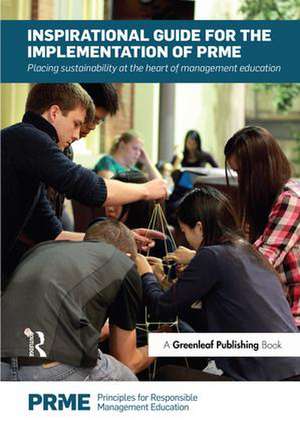Inspirational Guide for the Implementation of PRME: Placing Sustainability at the Heart of Management Education: The Principles for Responsible Management Education Series
Editat de Principles for Responsible Management Educationen Limba Engleză Paperback – iun 2012
Din seria The Principles for Responsible Management Education Series
- 8%
 Preț: 509.68 lei
Preț: 509.68 lei -
 Preț: 358.30 lei
Preț: 358.30 lei -
 Preț: 272.72 lei
Preț: 272.72 lei -
 Preț: 279.45 lei
Preț: 279.45 lei - 16%
 Preț: 260.25 lei
Preț: 260.25 lei -
 Preț: 327.48 lei
Preț: 327.48 lei -
 Preț: 308.61 lei
Preț: 308.61 lei -
 Preț: 385.73 lei
Preț: 385.73 lei -
 Preț: 388.16 lei
Preț: 388.16 lei -
 Preț: 378.33 lei
Preț: 378.33 lei -
 Preț: 369.22 lei
Preț: 369.22 lei -
 Preț: 378.33 lei
Preț: 378.33 lei -
 Preț: 319.43 lei
Preț: 319.43 lei - 15%
 Preț: 267.02 lei
Preț: 267.02 lei -
 Preț: 379.09 lei
Preț: 379.09 lei -
 Preț: 344.90 lei
Preț: 344.90 lei -
 Preț: 425.59 lei
Preț: 425.59 lei -
 Preț: 408.54 lei
Preț: 408.54 lei - 27%
 Preț: 400.74 lei
Preț: 400.74 lei -
 Preț: 355.05 lei
Preț: 355.05 lei - 15%
 Preț: 335.02 lei
Preț: 335.02 lei -
 Preț: 364.94 lei
Preț: 364.94 lei - 15%
 Preț: 478.89 lei
Preț: 478.89 lei -
 Preț: 288.67 lei
Preț: 288.67 lei -
 Preț: 496.01 lei
Preț: 496.01 lei - 18%
 Preț: 1003.43 lei
Preț: 1003.43 lei - 9%
 Preț: 935.20 lei
Preț: 935.20 lei
Preț: 303.31 lei
Preț vechi: 343.48 lei
-12% Nou
Puncte Express: 455
Preț estimativ în valută:
58.04€ • 60.60$ • 48.03£
58.04€ • 60.60$ • 48.03£
Carte tipărită la comandă
Livrare economică 05-19 aprilie
Preluare comenzi: 021 569.72.76
Specificații
ISBN-13: 9781909201019
ISBN-10: 1909201014
Pagini: 316
Dimensiuni: 148 x 210 mm
Greutate: 0.64 kg
Ediția:1
Editura: Taylor & Francis
Colecția Routledge
Seria The Principles for Responsible Management Education Series
Locul publicării:Oxford, United Kingdom
ISBN-10: 1909201014
Pagini: 316
Dimensiuni: 148 x 210 mm
Greutate: 0.64 kg
Ediția:1
Editura: Taylor & Francis
Colecția Routledge
Seria The Principles for Responsible Management Education Series
Locul publicării:Oxford, United Kingdom
Public țintă
Postgraduate and Professional Practice & DevelopmentCuprins
Introduction to the Inspirational Guide Section 1: Strategy and change: fostering a sustainability culture centred on PRME IntroductionThe buying in argument: How PRME can be used to enhance competitive advantageAustralian School of Business, University of New South Wales, Sydney, AustraliaDeusto Business School, University of Deusto, Madrid, Bilbao, San Sebastian, SpainUniversity of Applied Sciences HTW Chur, Chur, SwitzerlandSeattle Pacific University School of Business and Economics, Seattle, Washington, United StatesCranfield School of Management, Cranfield University, Bedford, England, United KingdomEGADE Business School, Tecnológico de Monterrey (ITESM), Monterrey and Mexico City, Mexico How to get started? The process of decision making related to participation in PRMEBentley University, Waltham, Massachusetts, United StatesCopenhagen Business School, Copenhagen, DenmarkDePaul University, Chicago, Illinois, United StatesHow change can be incentivised from the top (and other important roles of leadership)Aarhus University, Business and Social Sciences, Aarhus, DenmarkUniversity of Dubai, Dubai, United Arab Emirates Which are the best ways to embed PRME in the institution/programme’s organisational culture?Ashridge Business School, Berkhamsted, England, United KingdomSabanci University, Istanbul, TurkeyBabson College, Babson Park, Massachusetts, United StatesPractical ways to establish a multidisciplinary (and/or multi-stakeholder) PRME task force across the campusBentley University, Waltham, Massachusetts, United StatesThunderbird School of Global Management, Glendale, Arizona, United StatesHow to encourage and/or implement local community and campus initiativesChina Europe International Business School (CEIBS), Shanghai, ChinaEuromed Management, Marseille, FranceSection 2: Changing curricula and enabling faculty Introduction How to strategically adapt a curriculum to the PRME frameworkHanken School of Economics, Helsinki and Vaasa, FinlandQueen’s School of Business, Kingston, Ontario, CanadaSuccessful strategies for curriculum changeCopenhagen Business School, Copenhagen, DenmarkSeattle Pacific University School of Business and Economics, Seattle, Washington, United States How to teach complex decision-making/problem-solving skills effectivelyGriffith Business School, Brisbane, Queensland, AustraliaUniversity of Cape Town Graduate School of Business, Cape Town, South AfricaEGADE Business School, Tecnológico de Monterrey (ITESM), Monterrey and Mexico City, MexicoHow to enable faculty to integrate sustainability/responsible management topics into coursework and/or researchIEDC–Bled School of Management, Bled, Slovenia How to adapt curriculum/content within respective subjectsAsian Institute of Management, Makati, PhilippinesAustralian School of Business, University of New South Wales, Sydney, AustraliaGraziadio School of Business and Management, Pepperdine University, Malibu, California, United StatesIAE Business School, Universidad Austral, Pilar, Buenos Aires, ArgentinaRobert H. Smith School, University of Maryland, College Park, Maryland, United StatesINCAE Business School, Alajuela, Costa RicaHow to introduce global issuesGriffith Business School, Brisbane, Queensland, AustraliaAarhus University, Business and Social Sciences, Aarhus, DenmarkSection 3: Learning environments conducive to responsible management Introduction How to develop effective experiential/service learning to support the PrinciplesAlbers School of Business and Economics, Seattle University, Seattle, Washington, United StatesFordham University Schools of Business, New York, New York, United StatesMendoza College of Business, University of Notre Dame, Notre Dame, Indiana, United StatesHow to build powerful learning environments that foster responsible managementAston Business School, Birmingham, England, United KingdomCENTRUM, Centro de Negocios, Pontificia Universidad Católica del Perú, Lima, PeruHHL – Leipzig Graduate School of Management, Leipzig, GermanyRotterdam School of Management, Erasmus University, Rotterdam, NetherlandsKyung Hee University School of Management, Seoul, Korea How to find, produce and integrate case studies that promote PRME valuesRichard Ivey School of Business, Western University, London, Ontario, CanadaKozminski University, Warsaw, PolandSection 4: Aligning PRME and research Introduction How to encourage sustainability research within the parameters of traditional academic career expectations/advancement frameworks Audencia Nantes School of Management, Nantes, FranceEuromed Management, Marseilles, FranceUniversity of Stellenbosch Business School, Bellville, South AfricaSection 5: Fostering PRME partnerships and constant dialogue Introduction How to increase advocacy for PRME/sustainability issues within the management communityAudencia Nantes School of Management, Nantes, FranceLa Trobe Business School, La Trobe University, Melbourne, AustraliaHow to engage with the business community to create partnershipsMendoza College of Business, University of Notre Dame, Notre Dame, Indiana, United StatesNottingham University Business School, Nottingham, England, United KingdomSan Francisco State University College of Business, San Francisco, California, United States How to engage with the broader community to create partnershipsISAE/FGV, Curitiba, Parana, Brazil Nottingham University Business School, Nottingham, England, United KingdomKozminski University, Warsaw, PolandHow to engage students with PRMEHong Kong Baptist University (HKBU), Hong Kong, ChinaESADE, Ramon Llull University, Barcelona, SpainSection 6: Managing and consolidating PRME efforts Introduction How to translate PRME integration/adoption achievements into indicators and other measures for the purpose of evaluating progressAshridge Business School, Berkhamsted, England, United KingdomLa Trobe Business School, La Trobe University, Melbourne, AustraliaHow to successfully report on PRME integration/adoptionFundação Dom Cabral (FDC), Nova Lima, Minas Gerais, BrazilHanken School of Economics, Helsinki and Vaasa, FinlandBabson College, Babson Park, Massachusetts, United States Moving forward – What is the role of business in society?The American University in Cairo School of Business, Cairo, EgyptThe International Corporate Responsibility Conference (CR3+) Appendices Appendix 1: The Six Principles of the Principles for Responsible Management Education Appendix 2: The Ten Principles of the United Nations Global Compact Appendix 3: Co-editor biographies Appendix 4: Case story contributors
Notă biografică
Principles for Responsible Management Education,
Descriere
This Guide answers the most frequently asked questions concerning the implementation of PRME (the United Nations Global Compact-sponsored initiative Principles for Responsible Management Education) by highlighting real-world examples from the most engaged signatories – 63 case stories from 47 institutions from around the world.








